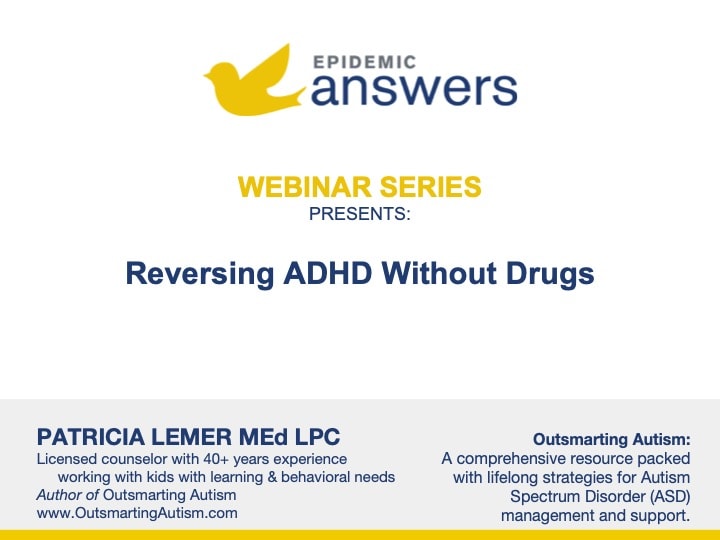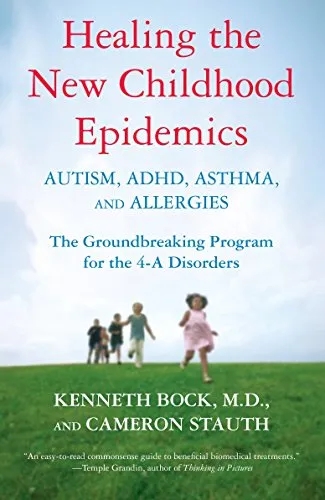Kelly Dorfman, MS, LDN discusses how stimulant medication is well documented in the press and medical literature, but what is not known is that stimulants are depressing.
While doctors originally prescribed stimulants primarily for patients with AD(H)D, the market has now grown to include anyone who is unmotivated, inattentive, impulsive or underachieving. Children with Down syndrome or with any diagnosis on the autism spectrum are candidates for stimulants.
The array of drugs in the stimulant family includes Adderall, Concerta, Dexedrine, Focalin, Metadate ER and Ritalin.
How Stimulants Work
Stimulants are milder versions of the street drug “speed.” Experts believe that stimulants modulate the activity of the neurotransmitter, dopamine. People are better able to concentrate and organize when their dopamine levels go up.
Individuals with hyperactivity benefit because the drugs increase activity in the area of the brain responsible for focus.
What Goes Up Must Come Down
Many children who speed up brain waves with a pill at breakfast experience a crash when the drug stops working in the afternoon. The result is spaciness, temper tantrums or crying.
Most stimulant drugs now come in an extended release version so the medication lasts past bedtime. Then, doctors may prescribe depressants or blood pressure medicine to counteract over-arousal and insomnia. Children have died using this risky combination of uppers and downers.
More Focused, But Dull
While immediate side effects with stimulants are obvious, subtle unexpected issues are more problematic in the long run.
When Ritalin-like drugs enhance dopamine, the activity of neurotransmitters connected to dopamine, like serotonin, will decrease. Neurotransmitters all talk to each other; you cannot change one without affecting another.
Serotonin is the happy neurotransmitter. When it is low, people feel depressed and anxious. Serotonin receptors are also plentiful in the language centers of the brain. Increasing serotonin often improves language in children on the autistic spectrum. Thus, when serotonin decreases in response to dopamine-enhancing stimulants, some children talk and interact less, become anxious and/or increase perseverative behaviors.
Many doctors prescribe anti-depressants for children on stimulants to counteract these common ill effects. For over 30 years Dr. Bernie Rimland, founder of the Autism Research Institute, collected data from parents on the effects of many medications in individuals with autism. Of all the drugs he tracked, stimulants caused the most problems with the least benefit.
Are Degenerative Diseases in the Future?
The most frightening concern with stimulants is how they may change the brain. Though prescribed for decades, long-term use has not been studied carefully. Dr. Nora Volkow at Brookhaven National Laboratory found that “speed” caused significant changes in the brain’s dopamine transporters.
Abusers of stimulants experience memory loss, reduced cognitive ability and impaired motor function. Stimulants also accelerate the aging process and may predispose people to neurodegenerative conditions like Parkinson’s disease. Nobody knows yet whether or not these changes are permanent or if they occur with milder versions of narcotics like Concerta.
What to Do if Your Child is Doing Well on Stimulants
Dietary modification, nutritional supplementation and tools like neurofeedback are preferable to stimulants because they lead to permanent gains by enabling the brain to process information more efficiently. Over the short run, however, such interventions cannot compete with the big shifts that sometimes occur immediately with Ritalin.
While these drugs have benefits, they do not entrain the brain into new ways of thinking. After long periods of use you will not only be stuck with the same old brain, but possibly a worn-out brain.
If a child truly needs medication to function in school, use the period on medicine to search for other strategies that could foster real growth. Consider alternative school placements or treat the school rather than the child. How many parents are told to consider medication one year by teacher A and the next year teacher B handles the same behavior with ease?
No doubt Albert Einstein, poor, distracted student that he was, would have been put on Adderall in today’s world. A well-meaning counselor would have pointed out to Mrs. Einstein that Albert was an underachiever and that his self esteem would suffer without medical intervention. If the goal was only to bring his grades closer to the level of his intellectual potential, he could have become a more compliant, attentive student. But at what cost? What a loss to the world that would have been!
About Kelly Dorfman MS LND
Kelly Dorfman is one of the world’s foremost experts on using nutrition therapeutically to improve brain function, energy and mood. Kelly’s special talent for integrating information from many sources and finding practical solutions has made her a popular speaker and workshop leader. She lectures extensively and is a member of Platform (formerly the National Speakers Association) and has been featured on numerous television programs including CNN’s American Morning.
Kelly’s award winning book, Cure Your Child With Food: The Hidden Connection Between Nutrition and Childhood Ailments (formerly known as What’s Eating Your Child) was given rave reviews by Publishers Weekly and the Washington Post.

As a go-to expert on nutrition issues, Kelly is frequently interviewed and quoted in the media. She has been featured in articles in The Wall Street Journal, Parade, Bethesda magazine, Living Without magazine, and the Huffington Post.
Kelly holds a master’s degree in nutrition/biology and is a licensed nutrition dietitian. She is a co-founder of Developmental Delay Resources, which has merged with Epidemic Answers. You can find out more about Kelly and her practice at kellydorfman.com
Still Looking for Answers?
Visit the Epidemic Answers Practitioner Directory to find a practitioner near you.
Join us inside our online membership community for parents, Healing Together, where you’ll find even more healing resources, expert guidance, and a community to support you every step of your child’s healing journey.
Sources & References
Volkow, N., et al. The dopamine motive system: implications for drug and food addiction. Nat Rev Neurosci. 2017 Nov 16;18(12):741-752.
Volkow, N.D., et al. Evaluating dopamine reward pathway in ADHD: clinical implications. JAMA. 2009 Sep 9;302(10):1084-91.
Volkow, N.D., et al. Loss of dopamine transporters in methamphetamine abusers recovers with protracted abstinence. J Neurosci. 2001 Dec 1;21(23):9414-8.
Resources
Books
Bock, Kenneth. Healing the New Childhood Epidemics: Autism, ADHD, Asthma, and Allergies: The Groundbreaking Program for the 4-A Disorders. New York, NY. Ballantine Books, 2008.
Brandes, Bonnie. The Symphony of Reflexes: Interventions for Human Development, Autism, ADHD, CP, and Other Neurological Disorders, 2016.
Campbell-McBride, Natasha. Gut and Psychology Syndrome: Natural Treatment for Autism, Dyspraxia, A.D.D., Dyslexia, A.D.H.D., Depression, Schizophrenia, 2010.
Crook, William. Help for the Hyperactive Child: A Practical Guide Offering Parents of ADHD Children Alternatives to Ritalin. Square One, 2007
Giustra-Kozek Jennifer. Healing Without Hurting: Treating ADHD, Apraxia, and Autism Spectrum Disorders Naturally and Effectively Without Harmful Medication. Howard Beach, NY: Changing Lives Press, 2014.
Guyol, G. Who’s Crazy Here?: Steps for Recovery Without Drugs for: ADD/ADHD, Addiction & Eating Disorders, Anxiety & PTSD, Depression, Bipolar Disorder, Schizophrenia, Autism. Stonington, CT: Ajoite Pub., 2010.




